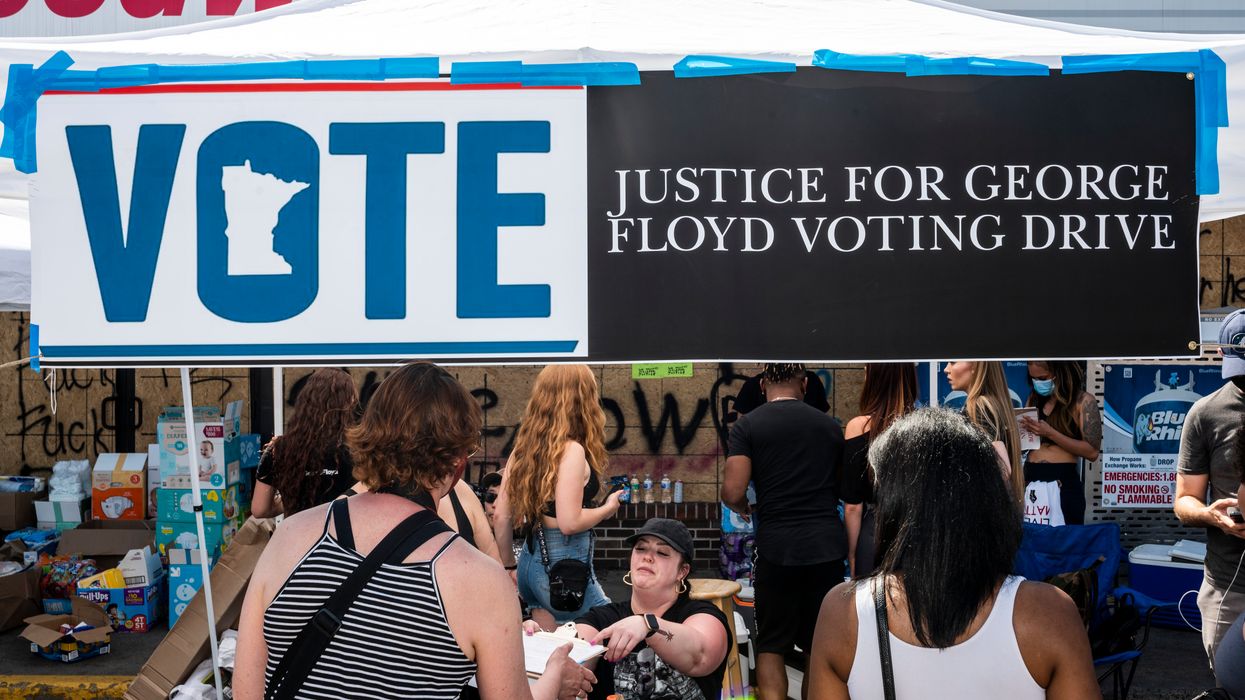America's founding principles of liberty and justice have always been compromised by the reality that Black Americans were enslaved when those words were written. Our democracy will never be strong until we fully acknowledge and address this fact.
As an organization that has made renewing democracy one of our core principles, The Leadership Now Project is committed to using our analytical capabilities and networks to more deeply understand the linkages between racism and democracy and taking meaningful action.
Our initial response has been two-fold. In June, we launched the Business for Racial Equity Pledge. Led by a group of Black members of our organization, the pledge calls on business leaders to commit to bold, anti-racist action within their organizations and includes provisions to encourage companies to look at how they are influencing policy and politics. With more than 1,100 signatures from CEOs, executives, academics, and other supporters we are committed to enabling action by this community of business leaders.
Second, we have dug into the data to better understand the drivers and impact of the connection between racism and democracy to inform our members, partners and the broader business community.
The result is "American Democracy, American Racism." This analysis looks at voter participation, electoral systems, and the concentration of campaign funding as factors preventing a truly representative democracy.
Here's what the data tells us:
At the core of democracy is the right to vote. A variety of policies make it harder for people of color to cast their ballot. States including Georgia, North Carolina and Kentucky have voter ID laws requiring all voters to present a government-issued photo ID. This disproportionately impacts Black Americans as 25 percent percent of Black voters do not have a photo ID as opposed to 8 percent of white voters.
Excessive purges of the voter rolls further impact minority voters. According to a study by the Brennan Center for Justice, counties previously covered by the Voting Rights Act due to a history of racial discrimination have a 40 percent higher purge rate than other counties, suggesting a differential impact on voters of color. In Georgia for instance, an estimated 1.5 million people have been purged from the rolls since 2012, with Black Americans' registrations being removed at a rate 1.25 times higher than white Americans'. Insufficient polling stations and staffing further contribute to disenfranchisement.
According to an analysis by USA Today, in majority-minority urban counties, voters lost an average of seven polling places and more than 200 poll workers between 2012 and 2016. In counties where at least 90 percent of the population was white, voters lost an average of just two polling stations and only two workers over the same period.
Electoral maps, the Electoral College and the census further under-represent people of color. Gerrymandering has been used deliberately — either to split minority votes among disparate districts in order to dilute their collective influence, or to concentrate minority voters into a single district to limit the number of representatives they elect.
In 2017, the Supreme Court ruled that North Carolina's congressional map was an unconstitutional racial gerrymander because it diluted Black voting strength in the state. (The General Assembly had packed as many Black voters as possible into just two of the 13 districts, concentrating their power there and diminishing it everywhere else.)
Similarly, the 2010 census over-counted white Americans by 0.8 percent and undercounted other races. Most notably, Native Americans living on reservations are undercounted by 4.9 percent, significantly lessening the federal resources allocated to their communities.
The intensifying concentration of campaign money exacerbates the challenge. Since the Supreme Court's Citizens United v. FEC decision, which largely deregulated political finance, donor concentration has grown considerably. In the 2018 campaign, 100 donors giving more than $1 million each accounted for 74 percent of the $800 million in super PAC donations.
Black Americans are particularly underrepresented among donors. According to a study by the University of California at Berkeley, of the $1.8 billion in contributions to 2012 candidates, 90 percent of contributions to presidential and congressional candidates above $200 came from majority-white neighborhoods. Only 3 percent of contributions came from majority-Black neighborhoods. Further, Black candidates consistently raise fewer resources than white candidates.
The result is a democracy in which the representatives do not reflect the diversity of the nation. For instance, while 37 percent of the population is people of color, only 11 percent of elected officials are people of color. Latinx Americans are the most underrepresented racial minority in political office: While they are 19 percent of the population, they hold only 8 percent of House seats and just four Senate seats.
While systemic racism is not new, Americans are awakening to it in an unprecedented way. In a recent Monmouth University poll, 76 percent said they see racial discrimination as a major problem in the United States — up from 51 percent five years ago
The data speaks for itself: Restoring the health of our democracy and achieving racial justice are inextricably linked. We look forward to doing our part, and working in partnership with many others, to address systemic racism and build a modern, resilient and representative American democracy.



















